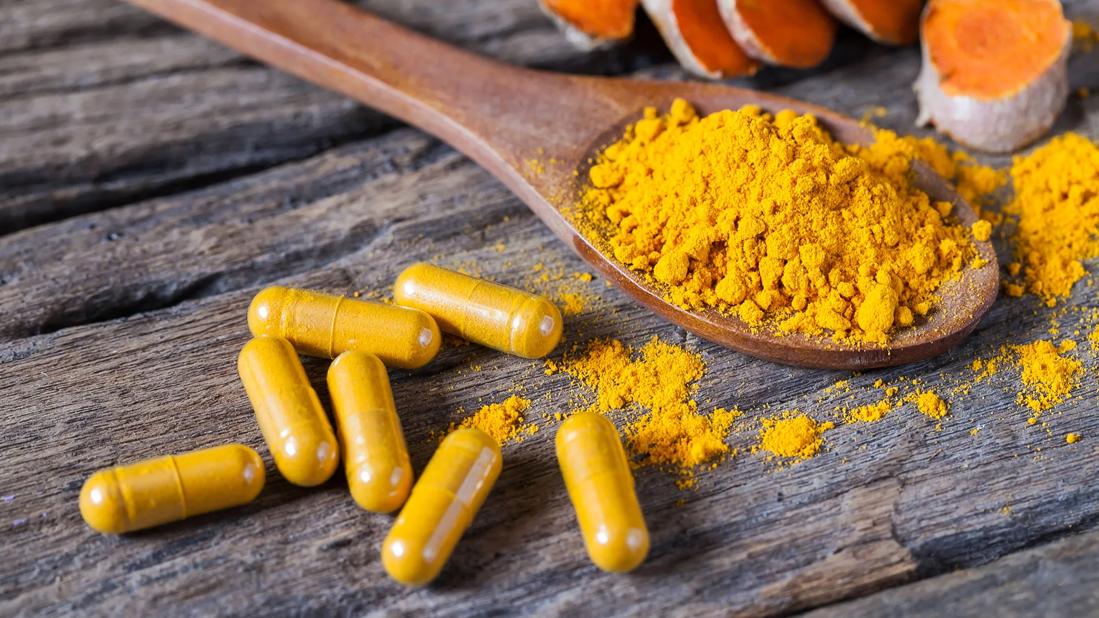This brightly colored spice can help fight inflammation and even improve your memory

Not familiar with turmeric? While you might not have a bottle of the spice in your cupboard, it’s likely you’re already acquainted. It’s what gives mustard and curry their vibrant golden hues.
Advertisement
Cleveland Clinic is a non-profit academic medical center. Advertising on our site helps support our mission. We do not endorse non-Cleveland Clinic products or services. Policy
Turmeric is a spice that comes from the root of the Curcuma longa plant, which is part of the ginger family. Its major active ingredient is curcumin. “Curcumin is what gives turmeric that bright, yellow color,” says registered dietitian Amber Sommer, RD, LD.
“It’s one of the main ingredients in a curry sauce — it has a pungent, slightly bitter and very earthy flavor,” she adds. “Turmeric is what gives curry that distinct smell and taste.” You can buy the ground spice from many supermarkets and spice retailers, or you can buy the fresh root and store it in an airtight container in the refrigerator.
But turmeric does more than just add a pop of color and taste. The curcumin in turmeric also delivers antioxidants and has anti-inflammatory properties.
Sommer discusses turmeric’s many benefits and shares advice on how to incorporate turmeric into your daily life.
The spice, which is easy to add to smoothies, teas and curries, shows promise when it comes to the following health benefits.
Turmeric may be beneficial for chronic conditions where inflammation starts to affect tissues in your body.
In a 2016 study, people with ulcerative colitis who took 2 grams of curcumin a day along with prescription medication were more likely to stay in remission than those who took the medicine alone.
Advertisement
“It won’t necessarily help during an active flare-up, but it may help prolong remission,” Sommer clarifies.
“Studies have also shown that turmeric may reduce joint inflammation and pain associated with osteoarthritis,” she adds.
A certain amount of turmeric could even boost your brain health. A 2018 study showed that 90 milligrams of curcumin taken twice a day for 18 months helped improve memory performance in adults without dementia.
“Researchers thought that the reduction in brain inflammation and curcumin’s antioxidant properties led to less decline in neurocognition, which is the ability to think and reason,” Sommer explains.
“Curcumin may also have a role in preventing the development of Alzheimer’s disease; however, that’s an area where we need more research,” she notes.
Free radicals can cause many issues, from skin damage to cancer. The best way to fight against free radicals is through antioxidants, which turmeric has plenty of.
A 2007 study showed that turmeric may help neutralize free radicals in your body and improve your overall health. And a 2019 study found that turmeric’s antioxidant effects may stimulate the action of other antioxidants and help fight oxidative stress in your body.
Thanks to its ability to help reduce inflammation and oxidation, turmeric may lower the risk of heart disease.
A study from 2012 followed 121 people who had coronary artery bypass surgery. A few days before and after their surgery, the group that took 4 grams of curcumin a day saw a 65% decreased risk of having a heart attack in the hospital.
Turmeric may also be helpful when used along with medication for managing cholesterol levels. A review from 2017 shows that curcumin is safe and may protect those at risk for heart disease by lowering certain levels of cholesterol — though more study is needed to look at how much and what type is effective.
According to a study from 2008, curcumin may also increase levels of serotonin and dopamine, which are chemicals in your brain that regulate mood and other body functions.
A 2019 study found that curcumin could help reduce cancerous cell growth and metastasis (spread of cancer). Evidence from studies like this one also shows that curcumin could help in cancer prevention, specifically, cancers that affect your digestive system.
How much turmeric you should take daily depends on your overall health. If you’re taking supplements, your doctors may suggest 500 milligrams of turmeric twice daily with food. (But more isn’t always better, so be sure to talk to your healthcare provider before adding any supplements to your routine.)
Advertisement
“It’s safe to take up to 8 grams per day, but my recommendation would be somewhere on the lighter side: 500 to 1,000 milligrams a day for the general population,” says Sommer.
For optimal absorption, try taking turmeric with heart-healthy fats like oils, avocado, nuts and seeds, she adds.
If supplements aren’t your style, you can also get a good amount of turmeric from certain condiments or by simply using the spice in your food.
Advertisement
Learn more about our editorial process.
Advertisement

The tropical fruit is a good source of antioxidants and vitamin C

High amounts of cholesterol and saturated fat in red meat may be linked to heart disease

The leaves and pods from this tree are rich in essential nutrients

This starchy root vegetable is a staple in many global cuisines — but it has to be prepared correctly, or it can cause serious concerns

These delicate green sprouts can give you an extra dose of vitamin K and other nutrients — but they’re not safe for everyone

Edamame, lentils and chicken breast are good sources of protein

Eating this root vegetable can help support your eye, heart and brain health

The flavorful herb is full of antioxidants that may help regulate blood sugar

The tropical fruit is a good source of antioxidants and vitamin C

Most people fall asleep within 10 to 20 minutes, but if your experience is different, adjusting your sleep schedule may help

Exploring your hidden side can lead to better understanding of what makes you tick